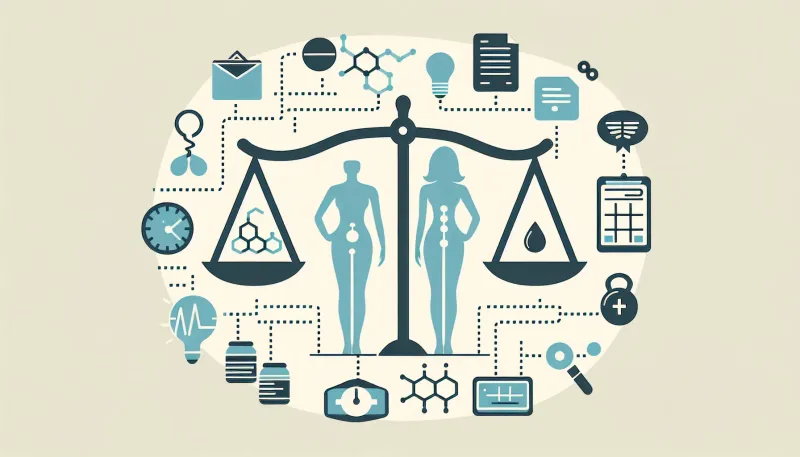Achieve Hormonal Balance and Weight Management: Expert Tips and Strategies

Discover expert tips and strategies for achieving hormonal balance and effective weight management. Learn how to address common challenges and find practical solutions for a healthier lifestyle.
Achieving hormonal balance and effective weight management are two important facets of a healthy lifestyle. Hormones play a crucial role in various bodily functions including metabolism, energy regulation, and fat storage. When hormonal imbalance occurs, it can lead to weight gain, fatigue, and other health issues. In this article, we will explore expert tips and strategies for achieving hormonal balance and managing weight effectively.
Understanding Hormonal Balance and Its Impact on Weight
Hormones are chemical messengers produced by the endocrine system, and they regulate many crucial processes in the body. These include metabolism, appetite, and fat distribution. Key hormones involved in weight management include insulin, cortisol, thyroid hormones, estrogen, and testosterone.
The Role of Insulin
Insulin is a hormone produced by the pancreas that helps regulate blood sugar levels. When insulin levels are consistently high due to a diet high in refined sugars and carbohydrates, it can lead to insulin resistance. This condition makes it difficult for cells to absorb glucose, resulting in fat storage and weight gain.
Cortisol and Stress
Cortisol, known as the stress hormone, is released during times of stress. While it plays a normal role in the body's stress response, chronic stress can lead to elevated cortisol levels. High cortisol levels can increase appetite and cravings for unhealthy foods, contributing to weight gain, particularly around the abdomen.
Thyroid Hormones
The thyroid gland produces hormones that regulate metabolism. Hypothyroidism, a condition where the thyroid is underactive, can slow down metabolism, leading to weight gain and difficulty losing weight.
Dietary Strategies for Hormonal Balance and Weight Management
An effective diet can play a significant role in achieving hormonal balance and managing weight. Here are some dietary strategies to consider:
Incorporate Whole, Nutrient-Dense Foods
Focus on consuming whole, unprocessed foods that are rich in nutrients. These include fruits, vegetables, lean proteins, healthy fats, and whole grains. Nutrient-dense foods provide essential vitamins and minerals that support hormonal health.
Balance Protein, Carbohydrates, and Fats
A balanced diet that includes adequate amounts of protein, carbohydrates, and healthy fats is essential for hormonal balance. Proteins aid in muscle repair and growth, fats support hormone production, and carbohydrates provide energy. Aim to have a balance of macronutrients in each meal.
Reduce Sugars and Refined Carbohydrates
Limiting the intake of sugars and refined carbohydrates can help prevent insulin resistance and promote stable blood sugar levels. Opt for complex carbohydrates such as whole grains, legumes, and vegetables.
Stay Hydrated
Hydration plays a key role in overall health and hormone function. Drinking sufficient water helps maintain cellular function and supports metabolic processes.
Lifestyle Changes to Support Hormonal Health
In addition to dietary strategies, certain lifestyle changes can help in achieving hormonal balance and effective weight management:
Regular Physical Activity
Engaging in regular exercise can help regulate hormone levels, improve mood, and aid in weight management. Both aerobic exercises like walking, running, and swimming, as well as strength training exercises, are beneficial.
Manage Stress Effectively
Chronic stress can disrupt hormone balance and contribute to weight gain. Practices such as mindfulness, meditation, deep breathing exercises, and yoga can help reduce stress levels and promote relaxation.
Get Adequate Sleep
Quality sleep is crucial for hormone regulation. Aim for 7-9 hours of sleep per night and establish a regular sleep routine. Poor sleep can lead to imbalances in hunger hormones like ghrelin and leptin, increasing appetite and cravings.
Conclusion
Hormonal balance and weight management are interconnected and vital for overall health. By understanding the role of key hormones and implementing dietary and lifestyle strategies, you can achieve and maintain hormonal balance and a healthy weight. Remember to consult with healthcare professionals for personalized advice and guidance.
By taking proactive steps to address hormonal imbalances and managing weight through a balanced diet, regular exercise, proper stress management, and adequate sleep, you can enhance your well-being and achieve your health goals.



























